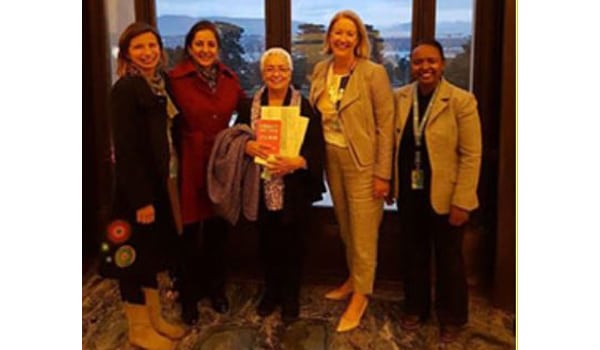
Statement: Responses to the COVID-19 pandemic must not discount women and girls
As governments attempt to tackle the unprecedented public health and economic crises caused by the Covid-19 pandemic, we are deeply concerned that women and girls are suffering even more egregious violations of their human rights. In the absence of gender sensitive intersectional responses, different forms of systemic discrimination already faced by women and girls will be exacerbated. The dramatic increase in women’s caregiving responsibilities, the rise in what was already an epidemic of sexual and domestic violence, the continued feminization of poverty, the proliferation of barriers to healthcare, especially pregnancy-related healthcare, will profoundly jeopardize women’s safety and well-being, economic security, and participation in political and public life, both during and after the pandemic….
Women are currently at the frontlines, providing essential medical and other services and keeping communities running while lockdowns are enforced. As a result, they face a tremendous increase in their working hours, and are at greater risk of being directly exposed to COVID-19. There are reports of nurses, doctors, midwives, and hospital cleaners contracting the virus while on duty, due to the lack of adequate provision of personal protective equipment. In some countries, health workers have been dismissed from their jobs or arrested for complaining about the inadequate means of protection. Others have been evicted by landlords for fear of contagion.
Restrictions on the provision of health services essential to women and girls, such as pre and post-natal care, termination of pregnancy and the availability of contraceptives, imposed in many countries to address the excessive demands on health services caused by the pandemic, also affects women and girls’ health disproportionately. In some countries, the human rights of women are being violated during and after pregnancy and childbirth in an attempt to allegedly expedite the process or prevent contagion (e.g. cesarean sections and forceps delivery performed without medical indication, denial of epidural, prohibition of partner’s presence, and separation of newborns from mothers). Some governments are creating new barriers to access to abortion services, by deeming it a non-essential medical procedure.
The statement continues to talk about women’s “disproportionate share of care responsibilities… Women are represented disproportionately in precarious, informal and poorly paid work, including domestic work….indigenous women lack information in their language on prevention strategies and on how and where to get health services. Rural and poor women who lack access to clean water at home face an increased burden in collecting water in crowded public spaces to cover their basic needs. This is linked to a higher risk of exposure to the virus. Due to emergency measures, many women and girls with disabilities have experienced the disruption of support networks essential for their survival and are in dire situations…
Despite the disproportionate negative effects of the crisis on women, as well as their presence in frontline roles and their critical role in keeping communities running, they are largely absent from local, national and global COVID-19 response teams, policy spaces and decision-making. However, in few countries, women are leading national responses that have recorded better outcomes and progress in curbing the virus….
A long list of excellent recommendations follows…
SOURCE: Office of High Commissioner for Human Rights,Working Group on Discrimination against Women and Girls, 20 April 2020



